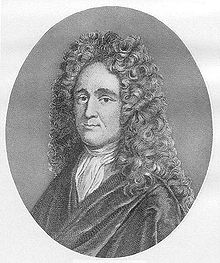- André Dacier
-
André Dacier (6 April 1651 – 18 September 1722), Latin Andreas Dacerius, was a French classical scholar and editor of texts. He began his career with an edition and commentary of Festus' De verborum significatione, and was the first to produce a "readable" text of the 20-book work.[1]
Contents
Biography
Dacier was born at Castres in upper Languedoc. His father, a Protestant lawyer, sent him first to the Academy of Puy Laurens, and afterwards to the Academy of Saumur to study under Tanneguy Le Fèvre. On Lefebvre's death in 1672, Dacier moved to Paris, and was appointed one of the editors of the Delphin series of the classics. In 1683 he married Anne Lefèvre, the daughter of his old tutor. Better known by her married name of Madame Dacier, she was also a learned translator of the classics.
In 1695 he was elected to the Academy of Inscriptions, and also to the Académie française; not long after this, as payment for his share in the medallic history of the king's reign, he was appointed keeper of the library of the Louvre. He died two years after his wife.
Works
The most important of his works were his editions of Pompeius Festus and Verrius Flaccus, and his translations of Horace (with notes), Aristotle's Poetics, the Electra and Oedipus Coloneus of Sophocles; Epictetus, Hippocrates and Plutarch's Lives.
In editing Festus, Dacier worked from the proposals of Joseph Scaliger, who provided notes and additions. His stated goal was to produce a "clear and educationally useful text." Addressing his work to the Dauphin (in usum Delphini), at that time Louis, he was more interested in the realia of Roman law, treaties, and the foundations of power than in the literary quality of the text or its lack thereof. Dacier's work on Festus was first published in Paris, 1681, with subsequent editions in 1692, 1699, and 1700.[2]
References
- "André Dacier (1651-1722)" (in French). Académie française. 2009. http://www.academie-francaise.fr/immortels/base/academiciens/fiche.asp?param=122l. Retrieved 2009-01-18.
 This article incorporates text from a publication now in the public domain: Chisholm, Hugh, ed (1911). Encyclopædia Britannica (11th ed.). Cambridge University Press.
This article incorporates text from a publication now in the public domain: Chisholm, Hugh, ed (1911). Encyclopædia Britannica (11th ed.). Cambridge University Press.
Notes
- ^ Fragmenta Selecta Antiquarian Booksellers, citing Martine Furno, La collection Ad usum Delphini (ELLUG, 2005), vol. 2, pp. 263–272.
- ^ Fragmenta Selecta Antiquarian Booksellers.
External links
Académie Française Seat 28 Jean Louis Guez de Balzac (1634) · Hardouin de Péréfixe de Beaumont (1654) · François de Harlay de Champvallon (1671) · André Dacier (1695) · Guillaume Dubois (1722) · Charles Jean François Hénault (1723) · Charles Juste de Beauvau (1771) · Philippe-Antoine Merlin de Douai (1803) · Antoine François Claude Ferrand (1816) · Casimir Delavigne (1825) · Charles Augustin Sainte-Beuve (1844) · Jules Janin (1870) · John Lemoinne (1875) · Ferdinand Brunetière (1893) · Henri Barboux (1907) · Henry Roujon (1911) · Louis Barthou (1918) · Claude Farrère (1935) · Henri Troyat (1959) · Jean Christophe Rufin (2008)
Categories:- 1651 births
- 1722 deaths
- Converts to Roman Catholicism from Calvinism
- French classical scholars
- French Roman Catholics
- Members of the Académie des Inscriptions et Belles-Lettres
- Members of the Académie française
- People from Tarn
Wikimedia Foundation. 2010.

